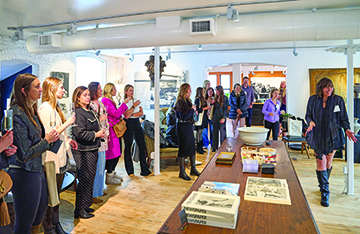
by Jessica Hughes | May 16, 2025 | Glendale City News
by Jessica Hughes
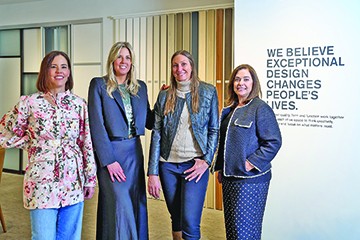
At California Closets with Mary Gelwick, Alexandra Sandberg, Kristin Becker, and Jena Brenneman (from left to right).

Cherry Creek Design Collective event at TOWNhouse.

Element Home hosted Jarred de Palo aka Mr Depalakua at their Cherry Creek store.
Just in time for the annual spring refresh we all look forward to in our homes, the Cherry Creek North neighborhood held its first ever Cherry Creek Design Day. Hosted by the Cherry Creek Design Collective, the inaugural event brought together the area’s top design retailers for a full day of networking, hands-on experiences, and inspiration from Cherry Creek’s design community.
Event organizers, Kristin Brown of Rocky Mountain Shutters and Kristine Vanacker of Ann Sacks, are also the brains behind the newly-formed Cherry Creek Design Collective — a group that aims to unite the neighborhood’s top design retailers that have flocked to the high-end Denver neighborhood over the last few years.
The idea came shortly after Vanacker moved her tile and stone showroom from Denver’s Design District to Cherry Creek, “She asked if there was a design group in Cherry Creek of like businesses and I said no but there should be,” says Brown. “Ever since that first meeting, we have been working with the Cherry Creek Chamber to build this group. This idea truly was to bring awareness to the public and professionals the great design and home furnishings offerings in Cherry Creek.”
Ann Sacks Tile & Stone showroom finds itself in good company with newer high-end design retailers moving into the Cherry Creek North shopping area in the past few years, including TOWNhouse and Joybird. As Cherry Creek North continues to expand its offerings of design retailers, Brown and Vanacker felt inspired to create a central event that highlighted these industry experts that reside in their backyard.
“We wanted to host an event that brought professionals into the neighborhood and got them exposure to the wonderful design and home furnishing offerings in Cherry Creek North,” says B

Attendees visit Ann Sacks Tile + Stone at the first annual Cherry Creek Design Collective.
rown. “This first event was focused on providing an introduction to the businesses a part of the collective, while our next event we plan to have a consumer day as well.”
Brown says the collective includes members from the Cherry Creek Chamber, members that work in the design and home furnishings in the Cherry Creek area, which can be retail locations in the neighborhood or professionals who want to work in the area.
Attendees began their journey at Rocky Mountain Shutters, Shades & Closets, where they enjoyed mimosas and breakfast treats, and explored offerings from Hunter Douglas Window Fashions and The Designery. The day continued with visits to various showrooms opening their doors, including organizing tips and tricks at California Closets, non-toxic interior design at Interior Define, with Uniquely You Decor, on-Budget Design Service at The Brass Bed, and more.
“The idea is that as a group we can get our individual businesses in front of the eyes of our consumers whether for professionals or direct to homeowners, and bring awareness to the wonderful home furnishing and design options in Cherry Creek North,” says Brown.
The Collective also commissioned local artist Michael Dowling to conclude the event with a meet-and-greet happy hour at TOWNhouse. “A wonderful addition to the event was from artist Michael Dowling. He donated a beautiful design featured on our swag bags, which he signed for each participant.”
As the Cherry Creek Design Collective looks to the future, they are excited to have the event grow in the number of businesses participating as well as people attending. “We hope to have a professional and a consumer day next year and we are excited to have this continue to be an annual event,” says Brown. “As a collective we will also be hosting more events throughout the year, including a walk with the owners and managers of these businesses this summer for the Cherry Creek Summer concert series, as well as a CEU day for design professionals and many more!”
To learn more about the Cherry Creek Design Collective follow them on Instagram @cherrycreekdesigncollective.
Photos provided by Cherry Creek Design Collective.
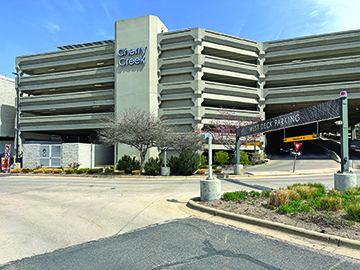
by Jessica Hughes | Apr 18, 2025 | Main Articles
by Jessica Hughes
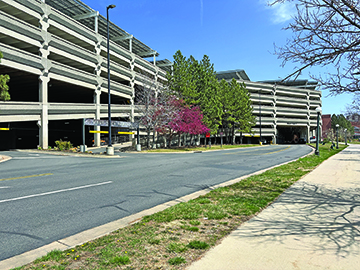
Cherry Creek Shopping Center now charges employees to park in its garages.

Employees and customers now both must pay to park in the Cherry Creek West Deck garage.
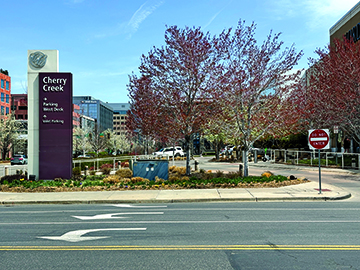
Cherry Creek Shopping Center employs over 3,000 people.
The Cherry Creek Shopping Center now requires employees to pay to park when clocking in for work, a change that has sparked confusion and frustration among workers. As of April 1, 2025, employees now must pay $20 per month if paid online or $25 per month if paid in person. Prior to this change, employees paid a one-time $30 refundable deposit to park.
When news broke out about this change, Michael Wilson, the Cherry Creek Shopping Center General Manager, said this had been in the plans since the mall first announced paid parking for customers in 2017, which received a similar response from mall patrons.
“Free parking for our tenant employees was always intended to be a short-term benefit that we offered when we originally implemented our paid parking program,” Wilson said. If this had always been in “the works,” why was it announced eight years later? A question Wilson did not specifically answer.
In 2017, the announcement of paid parking for customers was framed as a benefit that would ensure mall patrons had a spot to park by preventing non-shoppers taking up spots in the garage and parking lots. In fact, a Denverite article published in 2017, stated that the “roughly 3,500 people who work within the shopping center won’t be expected to pay for parking, the mall previously said in a statement.”
There was even reassurance that “fees are expected to be waived for the Cherry Creek Fresh Markets, Cherry Creek Arts Festival, Cherry Creek Sneak, and other community events,” which is also not the case anymore.
Employees are outraged both with the change and the timing of its announcement. “I don’t drive to work, so I don’t have to worry about it, but I still think it’s a crummy thing to do,” says a current employee at the Warby Parker store. “Everyone at this location thinks it’s stupid and is a cash grab from the mall by exploiting its employees. They’re basically pricing out people who want to work here. It’s a raw deal on all sides.”
But in a city where you pay to park almost anywhere you go, this doesn’t seem too far out of left field. “Free tenant parking is not a benefit widely offered at other businesses in the Cherry Creek neighborhood other than for those retailers who choose to pay for their employees’ parking, many of those spaces are significantly more per month.”
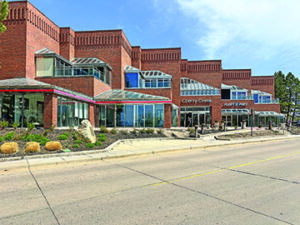
Cherry Creek Shopping Center.
He’s correct. Christina Lewis, a full-time salaried employee at Brillant Earth located in Cherry Creek North, pays $140 a month to park in the Clayton Lane West Garage, adjacent to Whole Foods. And with monthly parking rates at the Fillmore Plaza Garage even higher, at $170 a month, $20 a month doesn’t seem like much. But for both the mall employees who are part time high school and college students and the Simon Property Group who owns the mall, the monthly fee adds up.
With roughly 3,000 employees working at the mall, this new fee could generate around $900,000 per year (assuming each employee paid the full monthly fee of $25), a significant amount that plays out well for Simon Property Group, but not its workers.
“It’s $240 a year just to come to work. That sucks,” says the employee at Warby Parker. They say some stores are paying for employee parking. “Particularly billion-dollar corporate stores like Sephora. But some either don’t have the money to pay for their employees or are greedy themselves and refuse to.”
Employees also haven’t heard of any plans about how the additional money might be used. “There’s nothing we see that money going toward. No mall security, no nicer facilities, no fixes when we need them,” says the Warby Parker employee. When asked if there were any plans for improvement with additional income, Wilson did not provide any details or insight into this question.
With no planned improvements on the docket and plenty of back peddling about the rationale behind the decision, this new change seems to only hurt employees and benefit the wealthy corporation implementing it.
All photos by Jessica Hughes
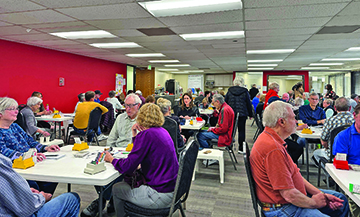
by Jessica Hughes | Mar 28, 2025 | General Featured
by Jessica Hughes
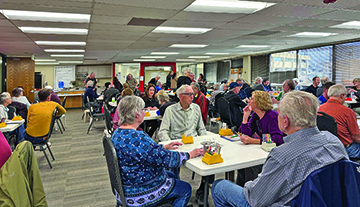
A packed house of players at the Denver Metro Bridge Studio.

Weekly bridge games are played at the Denver Metro Bridge Studio.
The tight-knit community of bridge players at the Denver Metro Bridge Studio in the greater Glendale area (Leetsdale Drive and Forest Street) works to rebuild five years after the COVID pandemic while preserving a game that offers far more than just entertainment.
Five years after a bridge tournament in Colorado Springs, turned into a COVID superspreader claiming the lives of six players, the Denver bridge community is still working to recover its momentum. “It became difficult after COVID. Bridge clubs closed and were going away,” explains Kathy McMahon, a dedicated member and player at the Denver Metro Bridge Studio. Like many social institutions, bridge clubs faced an existential threat during the pandemic.
For the game to survive, it had to pivot quickly. “We had to play online,” McMahon recounts. The American Contract Bridge League (ACBL), which governs competitive bridge in North America, developed online platforms where players could continue earning masterpoints — the currency of achievement in bridge competitions.
Despite these efforts, the pandemic created significant gaps in the community. The club lost many instructors and an entire generation of potential new players. “We missed the opportunity to train new people during COVID.
With the average age of bridge players in their late 60s or older, recruiting new enthusiasts has become vital for the game’s future. While the game is played by people of all ages, the benefits for seniors are particularly compelling: mental exercise, social con-
nection, and continuous learning. Bridge demands strategy, memory, and problem-solving skills — a true mental workout that research suggests may help delay cognitive decline. The game also provides crucial social connections, particularly important for seniors vulnerable to isolation.
“For seniors, playing bridge keeps them social and happy. It keeps brains healthy and keeps your brain going,” McMahon explains. These benefits extend beyond the individual to create vibrant communities centered around the game.
The Denver Metro Bridge Studio serves multiple roles — it’s both a competitive venue and a teaching center. The club offers lessons for beginners, mentorship programs, and games for various skill levels throughout the week. “We want bridge clubs to continue to be the social networks that they are,” says McMahon. “Playing in person brings this
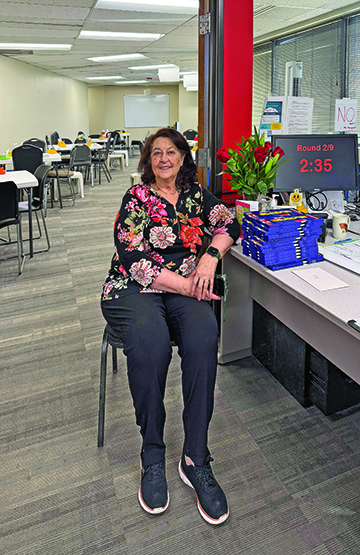
Denver Metro Bridge Studio Club Owner, Elly Larson.
social aspect, which is so important.”
A typical sanctioned game at the club takes about three hours, with players rotating to play the same hands against different opponents. While competitive games allow players to earn points toward rankings like Life Master (requiring 500 master points) or the prestigious Grand Life Master (requiring 10,000 master points), the club also hosts more casual social games for those who aren’t concerned with earning points.
The community is diverse in age and gender, with its oldest member turning 100 this year. McMahon herself didn’t begin playing until near retirement, proving it’s never too late to start. She now plays approximately three times per week with various partners.
“We are in the post-pandemic r
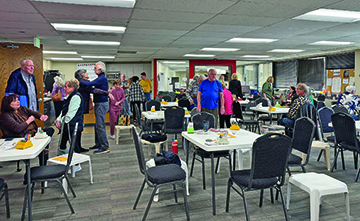
Denver Metro Bridge Studio meets at 5250 Leetsdale Dr. in Denver.
ebound, so there’s been much more of a need to advertise these clubs,” McMahon notes. The Denver Metro Bridge Studio has invested in outreach efforts aimed at attracting both seniors and younger players.
For newcomers interested in learning, the club offers beginner classes and assistance with finding partners. They provide food and drinks during games and maintain a welcoming atmosphere for players of all levels — though McMahon says that depending on when you play, beginners might find themselves facing off against the club’s “sharks,” their most accomplished players.
As online bridge helped save the game during pandemic lockdowns, the Denver Metro Bridge Studio is working to preserve what makes in-person play special: the bonds formed across the card table, the shared excitement of a well-played hand, and the community that grows around a common passion.
For those looking to exercise their minds, expand their social circles, or simply find a fulfilling hobby, visit www.bridgewebs.com/denvermetro.
Photos provided by Kathy McMahon
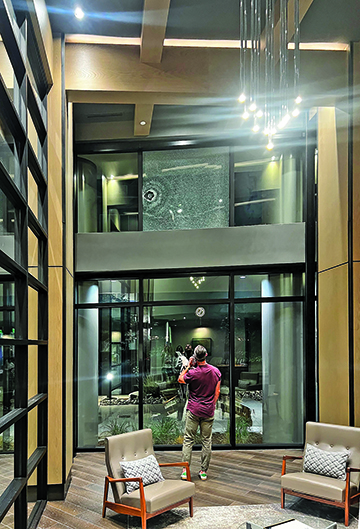
by Jessica Hughes | Mar 28, 2025 | Main Articles
by Jessica Hughes

Inside Gables Vista where bullet holes ripped through the lobby. Resident photo
No matter the price tag for rent, renter’s rights still matter. Gables Vista apartments in Cherry Creek, where rent prices average $2,000 per month, has garnered much criticism from its residents. Built in 2020, it only took the property five years to rack up a myriad of safety and habitability concerns. When a local resident first moved in, she described the building as being very safe, upscale, and, in general, had a positive initial experience. But in the last two years, things have changed and not for the better.
The first incidence of note she remembers took place in November 2023 with a drive-by shooting in front of the property. Since then, she had heard about cars getting broken into at the property over the last year, packages stolen from the front desk, and the concierge’s car stolen in 2024 from the guest parking lot. With crime ramping up at the property, she said she felt like the management team wasn’t being proactive enough in preventing these crimes.
But the most recent drive-by shooting on June 29, 2024, frightened her the most when multiple shots were fired into the lobby and ricocheted into a fourth-floor apartment. According to several residents, the family member of another resident had invited people into the building for a party, who were identified as aggressive and harassing other residents — despite the property’s policy of only two guests per resident at the pool and other public amenities spaces. After eventually being kicked out, the party crew continued out front harassing others and then that’s when roughly 20 shots were fired into the building.
The bullet holes shot into the building were left without repair for months and communication from management about the incident lacked empathy and any real concern for their safety according to residents. Despite safety concerns and expressed needs for additional security, she says management never implemented any additional safety enhancements like 24/7 security, even though management claimed an increase in patrol which she never witnessed.
In addition to safety concerns, the property experienced a slew of maintenance issues, including a carbon monoxide leak with little to no communicat
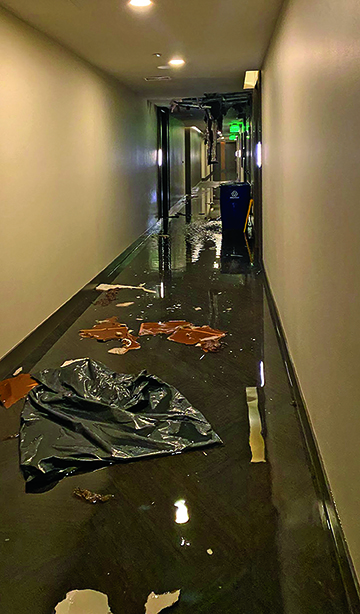
Interior damage at Gables Vista residents were forced to live amongst for days. Photo from Google reviews: Roy Ben Tzvi
ion from management, a gas leak and building-wide gas shut down leaving residents with no access to hot water or gas ranges for several days, and failed pipe repairs that caused two floods in the building’s 4th floor and 3rd floor parking garage, which prompted some residents to call the Colorado Department of Public Health and Environment.
Beyond our interview with this particular resident, a simple search on Google for Gables Vista reveals numerous one-star Google reviews from residents who have plenty to say about living conditions at this property. Some include: “Want bullet holes in your lobby doors for 3 months? Broken elevators and hot tubs that take 1-2 months to fix? Broken fridges take 2.5 months to fix? This was all in the last 6 months — been here for 3+ years and Gables Vista has become unlivable. Don’t recommend to anyone and will be leaving as soon as we can,” said Max Carlson from Google Reviews.
Another review from Evan Haas said, “Such a shame. New staff every week because they’re tired of tenants complaining about all of the things wrong with the building. Management refuses to address anything. Since the summer we’ve had break ins, cars stolen, drive by shootings, multiple water pipe leaks (not even winter), gas leaks, and the only hot tub has been down for a total of 4 months. And if you try to leave, they force you to pay to break your lease.”
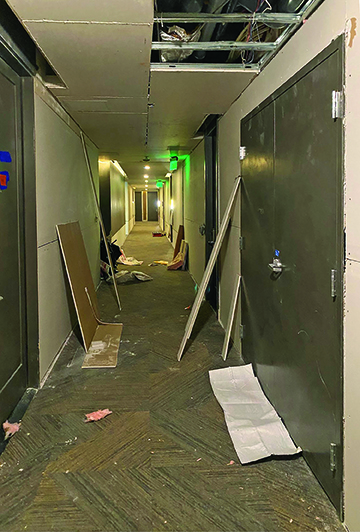
4th floor flood at Gables Vista that left residents in peril for days. Photo from Google reviews: Roy Ben Tzvi
The reviews continue warning others, “DO NOT move in here,” each coupled with photos and videos of tenants walking through inches of water from the flooding on the 4th floor.
The living conditions at Gables Vista got so bad that she reached out to the building inspector with the City and County of Denver, the CDPHE, and the office of councilwoman Amanda Sawyer explaining their concern for safety and habitability issues. Also trying to understand their legal rights as renters, she sought out information from the Colorado Poverty Project. Providing insight into the Warranty of Habitability, a specialist from the CPP cited…
“Under C.R.S. 38-12-503(3), if a tenant finds their residential premises uninhabitable due to a condition, notifies the landlord, and the landlord doesn’t respond within the specified timeframes (14 days for regular issues, 7 days for urgent ones), it’s presumed the landlord breached the lease. Then, it’s up to the landlord to prove otherwise.”
“According to C.R.S. 38-12-503(4) as modified as of May 3, 2024, if a condition seriously affects the tenant’s life, health, or safety, the landlord must offer alternative housing at the request of the tenant and at no cost to the tenant within 24 hours from that request. This housing should be like the tenant’s current place (including the same number of beds as the uninhabitable unit) and within 5 miles of the uninhabitable unit. The landlord is responsible for paying reasonable costs and a per diem for expenses that the tenant needs to pay to relocate to the alternative housing. If the alternative housing is needed for more than 48 hours, the landlord must either provide a kitchen setup or offer a daily allowance for m
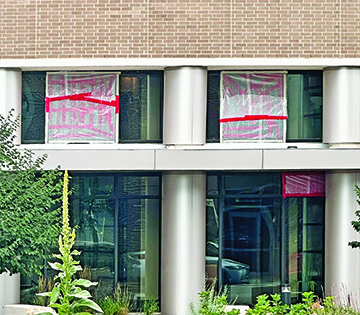
Building windows at Gables Vista sat unfixed for months after the shooting in June 2024. Photo from Google reviews: Max Carlson
eals and expenses.”
Residents say they received an email from management offering to reimburse for a day at Colorado Athletic Club to shower when water had been shut off for 12 hours due to a pipe repair, with no indication of when the water would be turned back on. And when an entire floor flooded, residents were sent emails stating they would not be put up into hotel rooms or reimbursed for food or other needs. Despite Colorado law, it appears on a few occasions that Gables Vista failed its tenants.
Amidst all of these issues, residents also learned the lease had been recently revised to not include a lease-break option, a $100 lease change fee was added as well as an extra charge for maintenance, and a $100 admin fee to renew your lease. One resident even reported her checking account information was removed from the pay platform leaving her with only debit or credit options, which charge a fee.
All of this has left current residents wondering “What’s next?”
Gables Vista sits at 375 S. Jackson St. in Cherry Creek. The 12-story property holds around 250 units and is owned and operated under Gables Residential. When asked how Gables Vista management was handling these issues, they declined to comment.
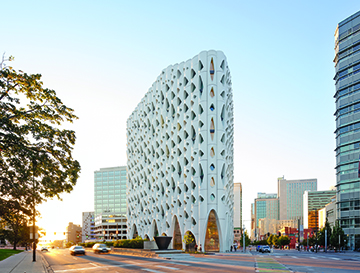
by Jessica Hughes | Jan 16, 2025 | Travel
by Jessica Hughes

The exterior design of the Populus Hotel is meant to resemble the iconic Colorado aspen tree. Photo by Jason O’Rear
A new hotel has been planted near Civic Center Park in downtown Denver. The Populus Hotel, the nation’s first carbon-positive hotel, opened its doors to the public on October 14 — almost three years after breaking ground in April 2022.
Developed by local real estate developer, Urban Villages, and designed by AD100 architecture firm, Studio Gang, the 265-room, 13-story hotel is turning heads with its distinct design and sustainability efforts. Meant to resemble Colorado’s iconic aspen tree, the hotel’s stark, white-washed exterior, dotted with windows in 20 different shaped “aspen eyes” is the backdrop to the Mile High City’s most cutting-edge hotel.
Focusing on bringing nature back into the city, the entire hotel replicates a natural living organism, the aspen tree. From the “forest floor” lobby to its open-air rooftop bar, the entire experience is meant to make you feel a part of nature in the middle of downtown.
While the Aspen-eye-shaped windows are the hotel’s most distinct design element, the hotel’s interior design also seamlessly captures nature’s elements while maintaining a strong commitment to environmental stewardship through carefully selected sustainable materials. The lobby showcases this approach with its ceiling featuring repurposed wood snow fencing from Wyoming. Guest rooms reflect the same eco-conscious philosophy, incorporating carpeting made from recycled biodegradable materials and headboards constructed from naturally fallen beetle-kill pine trees.
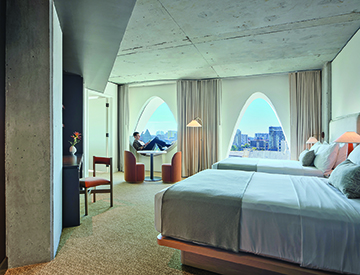
Modern and efficient guest rooms with aspen-eye windows stand out with picture-perfect views of downtown. Photo by Steve Hall
“This is a design concept that focuses on bringing nature back into the city,” says George Prine, the General Manager of the Populus. “Being in Colorado, it feels natural to have a hotel that highlights the beautiful nature around us, making nature all a part of the experience.”
Two restaurant concepts anchor the 265 rooms, with Pasque restaurant on the ground floor, and the rooftop restaurant and terrace, Stellar Jay, where the views of the state capitol building, the Denver Art Museum, and the Denver Public Library take center stage. But the views don’t stop there. Guests will enjoy picture-perfect views through the aspen-eye windows, framing downtown Denver’s iconic buildings and distant mountains.
Accommodations span from the Grove and Aspen rooms to the premium Pando Suite, which crowns the top floor.
But the hotel’s design isn’t the only thing that has garnered all the attention. As the nation’s first carbon-positive hotel, the Populus has also ushered in a new standard in the hospitality industry of what it means to be environmentally sustainable.
Populus reduced its operational carbon footprint through a combination of sustainable design and construction techniques, including the use of low-carbon concrete, an insulated façade system, and GFRC rain screen. And to reduce its carbon footprint even more, Populus is Colorado’s only hotel without a parking lot. But to be carbon-positive, not just carbon-neutral or net-zero, the Populus goes beyond cutting carbon emissions, it is committed to putting more “positive” effects back into the environment.
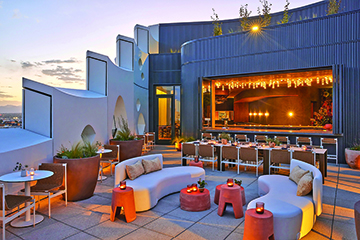
Stellar Jay rooftop terrace invites guests to take in the views and a crafty cocktail. Photo by Yoshihiro Makino
The Populus worked with the U.S. Forest Service and other agencies to further offset its carbon footprint by planting over 70,000 trees (172+ acres) in Gunnison County. In fact, at the heart of the hotel’s efforts to be the first “carbon positive” hotel in the U.S., the Populus will offer its One Night, One Tree program — planting a tree for every night’s stay. In partnership with the National Forest Foundation (NFF), Populus will plant one tree for every night’s stay.
The hotel’s two unique dining concepts are also making headlines with their goal to turn 100% food waste into compost to be shared with local farmers. Pasque, an all-day dining destination on the hotel’s lobby floor, and Stellar Jay, the lively rooftop restaurant and bar, are setting a new standard of food from table to farm, establishing a circular solution for food waste.
To achieve this, Populus will be the first hotel in downtown Denver to use unique “Food Cycling’’ technology from BioGreen 360. Using this technology, the hotel aims to divert 100% of its food waste away from landfills and turn it into all-natural compost that it will give back to local farmers in Colorado.
“The opening of Populus marks an incredibly significant milestone and represents a new model of environmentally conscious hospitality that will forever change the guest experience for mindful travelers, while adding vibrancy to the city of Denver,” said Jon Buerge, President of Urban Villages. “We are excited to watch Populus come to life as the center of a thriving community, becoming everything from the new neighborhood hotspot to a must-visit hotel destination, all while inspiring the industry to rethink how hotels can prioritize the health of the planet in a positive, engaging, and meaningful way.”



















